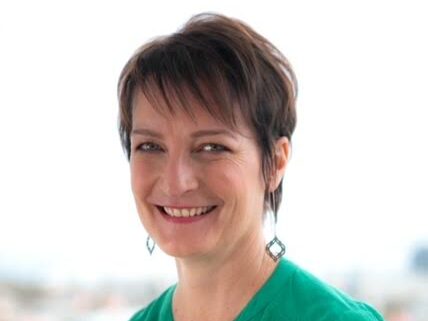(RYE, N.Y.) —Erika Bornman sits across from an imposing man with graying hair and a ruddy complexion. He’s always impeccably dressed, but today, his suit jacket is removed, and his tie sits loosened at the neck. A weak sunlight filters through the window offering little respite from the oppressive wood paneling that surrounds the room. He regards her carefully as she readies herself for his wrath. And when it comes, it’s vitriolic.
“God’s curse is now on your life, Erika,” he says.
Nestled in the Valley of a Thousand Hills on the southeast coast of South Africa, among green pastures and a dense mist, is a place called KwaSizabantu. The 1,300 acre compound resembles a utopia with farms, a school, a church, aQuellé water bottling plant, and its own airfield.
KSB was founded in 1970 by Reverend Erlo Stegen, who envisioned an egalitarian society promising equal rights and opportunities to all its followers. The group’s doctrine promised a place in heaven if members confessed all their sins to leaders within the mission, and lived a life devoted to and fearful of God. Yet KwaSizabantu is a place shrouded in a dark history that has spanned generations.
Instead of a Christian mission where people find sustenance and spiritual redemption, the group built an establishment based on fear, misogyny, and abuse.
Erika Bornman was a happy 10-year-old when her family came to live at KwaSizabantu. Over the years, however, her days spent singing with friends or escaping with a book slipped away as the mission’s rules dominated her everyday life. Bornman was forced to endure emotional, psychological, and sexual abuse until she left the mission at age 21.
“I had a good foundation for the first nine years of my life,” Bornman told The Click. “I never doubted my parents loved me.”
That was, until she joined the mission and her sense of self fell apart.
“I was very outgoing, and they turned me into a ‘shadow child,’” she said. “But they never managed to break me.”
Author and psychiatrist John Ratey explains the Shadow Child Syndrome in his book. He writes that it occurs as a result of being raised in a non-nurturing environment, which leads to forms of mental illness such as depression, anxiety, and bipolar disorder. At KSB, feelings of loneliness and isolation are exacerbated by a kind of everyday fear used to control its members. The fear of Stegan, the fear of the outside world, and the fear of God are all instrumental to the KSB doctrine. Also critical was the ever-present threat of physical abuse.
“If you didn’t bring in your homework, teachers would beat us on the hand with rulers,” Bornman said. “You would get hit for speaking to a boy, or pulling a face, or swearing.”
Greg Damron, a public health consultant living in Santa Rosa, Calif., traveled to the mission as a youth visitor in 1989, when he met Bornman, who was 18 at the time.
“I was staying for two months in the home of one of the senior leaders at the mission,” Damron said. “Erika came into the house to deliver a message to this leader, and I noticed a very pretty young woman quietly standing with her back to the wall. She seemed painfully shy, if not held back by something. There seemed to be a cloud over her.”
Damron did not speak with Bornman — fraternizing between males and females was prohibited, and friendships were discouraged. In accordance with living God’s will, peers were incentivized to report their so-called indiscretions to leaders, a little like East Germans before the fall of the Berlin Wall.
“Trusting people becomes a serious issue,” said Celimpilo Malinga, a friend of Bornman who also grew up at the Mission. “It’s not something we do or are taught.”
Malinga and Bornman met at KwaSizabantu as children, and later reconnected as adults. “Erika was a few classes ahead of me,” Malinga said. “She was kind. I liked her.”
Yet, as Damron said, there was a cloud over Bornman.
In her late teens, Bornman went to study abroad with KSB students and the idea of a life outside the mission began to germinate.
“I had been in Europe for almost a year to polish my French and German, and while I was only allowed to be with people from KSB, I did get a glimpse of the real world, people walking around and dining with friends,” she said.
Upon returning to KSB, Bornman’s views had begun to change. Ideas ingrained in her since childhood, like Stegen receiving messages directly from God, no longer resonated. She recalls the moment that solidified her decision to leave the mission and start the difficult journey toward a life she knew nothing about.
“I began to gain more clarity about just how destructive their doctrine is,” Bornman said.“ The absolute turning point was upon my return and my counselor once again kissed me. I realized I couldn’t live like that, and so I planned my escape.”
Bornman eventually went to live with her Aunt Iris in Pietermaritzburg at the age of 21. A year later, Stegen summoned her back to ask her if she was living the life God intended for her. When she told him she had not consulted God in her decision to leave, while in that wood-paneled room, he put a curse on her life.
“The curse mentally hung over me for a long time,” Bornman said. “But that curse also had me question how God could protect men like that while someone like me, who was genuinely looking to do good, would go to hell. I’m grateful for it now because it confirmed once and for all that I wasn’t one of them and that I had to make a life outside KSB.”
However, escaping the psychological abuse she endured for years proved difficult as she began her life outside the mission.
“I didn’t get a driver’s license until I was 35 years old because I thought I was going to be struck by lightning or die in a car accident,” she said, referring to Stegen’s incantation.
She spent the next seven years waiting for that bad thing to happen. When lightning never struck, she began to speak out.
“I realized that there are these kinds of high-control groups all over the world with pretty much the same modus operandi,” she said. “I thought my story could help others.”
Bornman first publicly spoke out about the mission’s abuse of children in 2000. The mission — which Bornman and others call a cult — posits that a child’s spirit should be broken by age 3. Beatings were common when she was there. She details the abuse she and her classmates endured in her book, Mission of Malice.
“Books have saved me many times in my life,” Bornman said. “As a child they provided an escape, and as an adult they gave me hope.”
Bornman hopes her book will help those who have been forced to give up their sense of self in order to survive. She also feels strongly about the need for mental and psychological support where cult survivors have access to therapy and find the tools they need for their mental health.
“The curse was so final, so authoritative,” she said “It’s only in retrospect that I can see how once I rejected him and his doctrine, I was open to experience all that life offers.”


